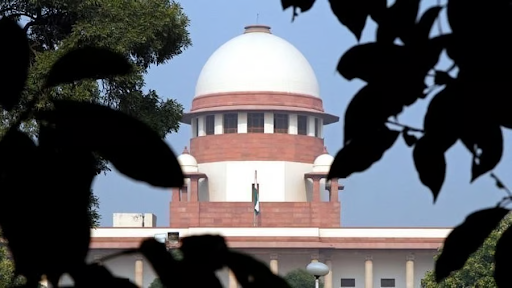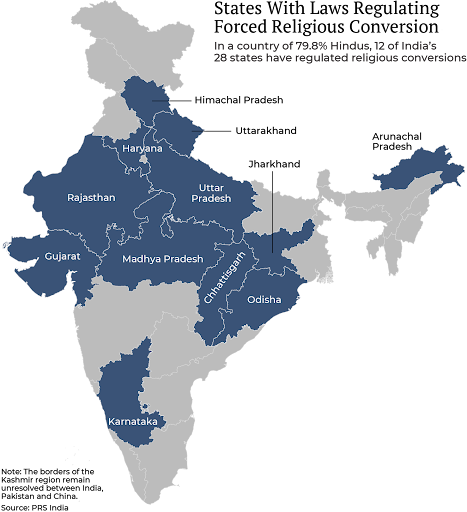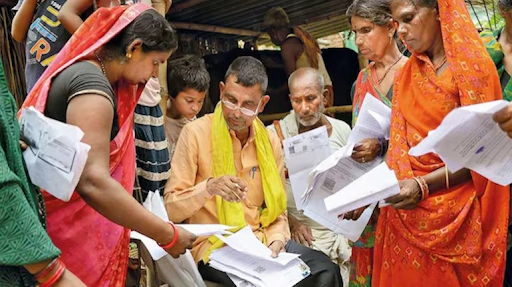



Anti-conversion laws, meant to curb forced conversions, face constitutional challenges, particularly violating Article 21 (Right to Privacy and Choice). Critics argue vague terms and the reversed burden of proof lead to misuse against inter-faith couples and minorities. The Supreme Court must now balance individual liberty with the state's interest in public order.

Copyright infringement not intended
Picture Courtesy: deccanherald
The Supreme Court is reviewing the constitutional validity of anti-conversion laws enacted by several states.
|
Read all about: Forced Religious Conversions l Essential Part of Religion l SC Verdict on Religious Conversion l Forced Religious Conversions |
Anti-conversion laws, officially termed 'Freedom of Religion' Acts, are designed to regulate religious conversions.
Its objectives are to prohibit conversions made by force, fraud, misrepresentation, coercion, allurement, or marriage.
Currently, around 12 states have enacted such laws, including Uttar Pradesh, Madhya Pradesh, Gujarat, Uttarakhand, and Karnataka.

Article 25(1): Guarantees all persons the "freedom of conscience and the right freely to profess, practice and propagate religion." This right is subject to public order, morality, and health.
Rev. Stanislaus vs State of Madhya Pradesh (1977)
The Supreme Court validated early anti-conversion laws, ruling that the right to propagate does not include fundamental right to convert. The Court affirmed state power to enact such laws for public order.
K.S. Puttaswamy Judgment (2017)
This judgment established the Right to Privacy as a fundamental right under Article 21, affirming an individual's autonomy in making personal life decisions.
Hadiya vs. Ashokan K.M. (2018)
The Supreme Court upheld an adult's right to choose their religion and life partner, stating that these choices are central to one's identity and fall within the zone of privacy.
Violation of Fundamental Rights: Critics argue they violate:
Vague and Ambiguous Terminology: Terms like 'allurement', 'undue influence', and 'misrepresentation' are often vaguely defined, leaving them open to broad and arbitrary interpretation by law enforcement.
Reversal of the Burden of Proof: These laws often reverse the burden of proof, compelling the accused to prove the conversion was voluntary, a departure from the 'innocent until proven guilty' standard.
Targeting of Inter-faith Marriages: Recent laws in states like Uttar Pradesh and Gujarat specifically penalize religious conversion for marriage, often dubbed 'love jihad' laws.
Potential for Misuse: These laws are sometimes misused by extremist groups to harass religious minorities.
Precise Definitions: Legislatures must clearly and narrowly define terms like 'allurement' and 'coercion' to prevent their misuse and protect genuine religious freedom.
Judicial Scrutiny: The Supreme Court is hearing challenges to the state laws' constitutional validity; its judgment will define the limits of state power over faith and personal liberty.
Procedural Safeguards: The 'presumption of innocence' must be upheld, placing the burden of proof on the prosecution, not the accused.
Promoting Social Harmony: Shift focus from punitive laws to inter-faith dialogue, mutual respect, and understanding to tackle the root causes of communal tension.
Revisiting the Stainislaus Ruling: CConstitutional experts recommend a larger Supreme Court bench re-examine the 1977 judgment on the scope of the right to 'propagate' religion in modern India.
The anti-conversion laws aim to prevent forced conversions but face criticism for being ambiguous and violating individual rights, requiring clear legislation and strong judicial oversight to ensure constitutional adherence and protection of religious freedom.
Source: HINDUSTANTIMES
|
PRACTICE QUESTION Q. Which of the following Supreme Court judgments most directly establishes an adult's right to choose their faith and marry a partner of their choice as a fundamental right? A) Rev. Stanislaus vs State of Madhya Pradesh C) K.S. Puttaswamy vs Union of India C) Shafin Jahan vs Asokan K.M D) Indra Sawhney vs Union of India Answer: C Explanation: The Hadiya case judgment upheld an adult's right to choose their faith and marry a partner of their choice, linking it to fundamental rights under Article 21. |
The stated objective of these laws, officially called "Freedom of Religion" Acts, is to protect vulnerable sections of society (like minors, women, and SC/ST communities) from religious conversions carried out through force, fraud, undue influence, coercion, or allurement, thereby preserving public order and social harmony.
The Supreme Court's K.S. Puttaswamy (2017) judgment established the Right to Privacy as a fundamental right under Article 21, which includes the freedom of thought and self-determination. Anti-conversion laws conflict with this by mandating state intrusion into an individual's intensely personal decision of choosing their faith, thereby violating their autonomy and personal liberty.
Recent anti-conversion laws often target inter-faith marriages by creating procedural hurdles and allowing for harassment. They are frequently used to challenge marriages solemnized under the Special Marriage Act, 1954, by framing the conversion of one partner (before or after marriage) as a result of coercion or allurement, even if it is consensual.



© 2026 iasgyan. All right reserved